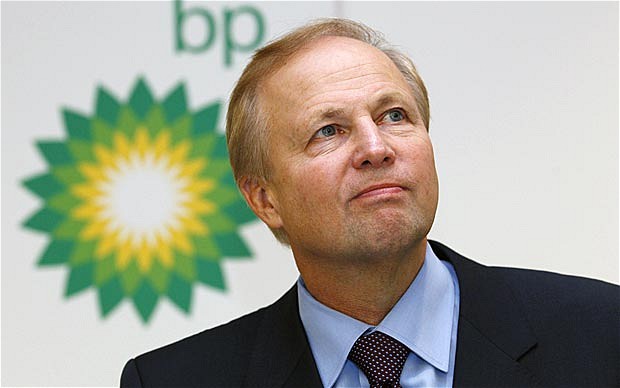BP’s $18.7 billion settlement over the 2010 Gulf of Mexico spill draws a line under years of uncertainty to allow it to focus once again on growth but could make it an acquisition target.
The British energy giant, whose shares are still some 35 percent below their value before the largest offshore spill in U.S. history, still faces headwinds from the sharp decline in oil prices and its large exposure to Russia.
The settlement lifts a huge weight off Bob Dudley, BP’s first U.S. chief executive who was appointed leader just six months after the oil spill. He was tasked with rebuilding a company responsible for one of the world’s worst oil spills after an explosion on the Deepwater Horizon rig killed 11 people died and has since faced an indefinable mountain of legal claims.
“For us this is closure for the major legal proceedings from the event,” Dudley told reporters on Thursday. “This makes it much clearer in terms of planning the future of the company and managing and phasing our investments.”
For BP, which made $3.78 billion in profit last year, putting a figure on the spill bill will allow it to count its spare cash and start thinking about where to spend it.
“We’ll be able to spend more time on what we do well; which is finding, producing, developing, selling products in oil and gas,” Dudley said.
The news of the settlement was received with relief among investors, too with BP shares soaring nearly 5 percent following the announcement.
“This settlement brings clarity and certainty for the future payments so that is sort of a relief,” said Jean-Pierre Dmirdjian, analyst at London-based Liberum brokerage.
“The settlement seems to mark the end of many years of uncertainty and that is good news. BP management can now focus entirely on operations, especially in the current challenging environment.”
BP had significantly narrowed its oil production business in the years following the Gulf of Mexico to Russia, Azerbaijan and Iraq and, like its peers, slashed capital expenditure this year in the face of lower oil prices.
The settlement puts BP on solid ground that will allow it to increase its dividend and expand, said Stephen Simko analyst at research firm Morningstar.
“Using its newfound dry powder to address its portfolio weaknesses could go a long way toward shoring up its outlook in the era of low oil and gas prices,” Simko said.
BP was forced to shed over $40 billion of assets to cover the spill’s clean up and litigation costs, leading to speculation that it could be acquired by a larger peer.
Managing Director, International Upstream Research at Tudor, Pickering Holt and Co investment bank, Anish Kapadia said that while the settlement made BP a more attractive acquisition, no company was likely to have the will to invest in BP, with a market capitalisation of around $120 billion.
The near halving of oil prices since last July to around $60 a barrel and Royal Dutch Shell’s $70 billion bid to buy smaller rival BG Group had revived that speculation and the settlement could offer the clarity needed for any deal.
“The one thing it might do is BP had always been slightly mentioned as takeover play since its been in this trouble, and I think companies have been slightly hesitant to make a bid while this has been hanging over it,” said Joe Rundle, head of trading at ETX Capital.
The settlement “does clear the way for a potential bid,” he added.
Copyright Ships & Ports Ltd. Permission to use quotations from this article is granted subject to appropriate credit given to www.shipsandports.com.ng as the source.

